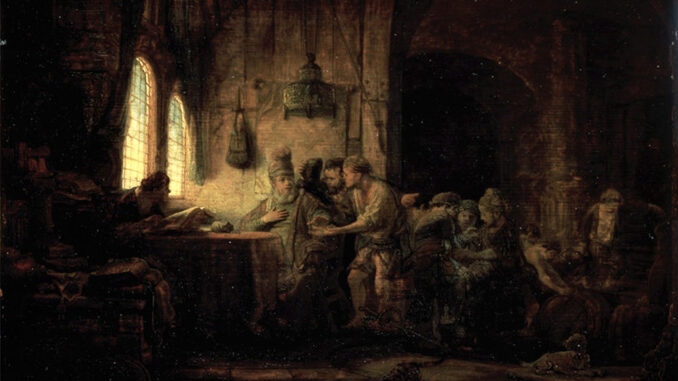
This series explores the Ten Commandments through the words and admonishments of Arthur Pink.
“Thou shalt not steal” (Exodus 20:15).
The root from which theft proceeds is discontent with the portion God has allotted, and therefrom a coveting of what He has withheld from us and bestowed upon others.
“Thou shalt not steal.” The positive duty here enjoined is this: you shall by all proper means preserve and further both your own and your neighbor’s estate. Thus, we are to “provide things honest in the sight of all men” (Romans 12:17). It requires honesty and uprightness in our dealings one with another, being founded upon that first practical principle of all human conduct: “whatsoever ye would that men should do to you, do ye even so to them” (Matthew 7:12). Thus, this commandment places a sacred enclosure around property which none can lawfully enter without the proprietor’s consent.
The solemn and striking fact deserves pointing out that the first sin committed by the human species entailed theft: Eve took of (stole) the forbidden fruit. So, too, the first recorded sin against Israel after they entered the land of Canaan was that of theft: Achan stole from among the spoils (Joshua 7:21). In like manner the first sin which defiled the primitive Christian church was theft: Ananias and Sapphira “kept back part of the price” (Acts 5:2). How often this is the first sin committed outwardly by children — therefore this Divine precept should be taught to them from earliest infancy.
“Thou shalt not steal.” The highest form of this sin is where it is committed against God, which is sacrilege. Of old He charged Israel with this crime: “Will a man rob God? yet you have robbed Me. But you say, Wherein have we robbed You? In tithes and offerings. You are cursed with a curse: for you have robbed Me, even this whole nation” (Malachi 3:8, 9). But there are other ways in which this wickedness may be committed besides that of refusing to financially support the maintenance of God’s cause on earth. God is robbed when we withhold from Him the glory which is His due, and we are spiritual thieves when we take credit for what God has done. “You have not chosen Me,” said Christ, “but I have chosen you” (John 15:16).
Another way in which we rob God is by an unfaithful discharge of our stewardship. This commandment then requires from us that we administer our worldly estate, be it large or small, with such industry as to provide for ourselves and those dependent upon us. Idleness is a species of theft. It is playing the part of the drone and compelling the rest of the hive to support us.
One who obtrudes himself into the Gospel ministry without being called of God in order to obtain an easy and comfortable living is “a thief and a robber” (John 10:1).
God has ordained that men should earn their bread by the sweat of their brow, and with that portion which we thus honestly obtain, we must be satisfied. But some are slothful and refuse to labor, while others are covetous and crave a larger portion. Hence many are led to resort to the use of force or fraud in order to gain possession of that to which they have no right. Theft, in general, is an unjust taking or keeping to ourselves what is lawfully another’s. He is a thief who withholds what ought to be in his neighbor’s possession just as much as one who takes his neighbor’s property from him.
This commandment can be violated by both by employer and labor. If in the past the poor have been wronged by inadequate wages, the scales have now turned in the opposite direction, when employees often demand a wage that industry cannot afford to pay them. If on the one hand it is right that a fair day’s work should receive a fair day’s pay, it holds equally true that a fair day’s pay is entitled to a fair day’s work. But where loafing obtains it does not receive it.
Lying advertisements are a breach of this commandment. Tradesmen are guilty when they adulterate or misrepresent their goods, and also when they deliberately give short weight or shortchange to their customers. This commandment is broken by tenants who heedlessly damage the property and furniture of the owner. Evasion in paying taxes is another form of theft; Christ has set us a better example (Matthew 17:24).
We can avoid violations of this commandment if we consider frequently the vanity of all things temporal, practice submission to Divine providence, meditate much on the Divine promises (such as Hebrews 13:5, 6), be temperate in all things, set your affections on things above, and remind yourself daily of the earthly lot of Christ.
Arthur W. Pink, born in Nottingham, England, in 1886, pastored churches in Colorado, California, Kentucky, and South Carolina. He moved to Sydney, Australia, and then returned to England in 1934. Pink relocated to Lewis, Scotland, in 1940 and remained there until his death in 1952 at the age of 66.
